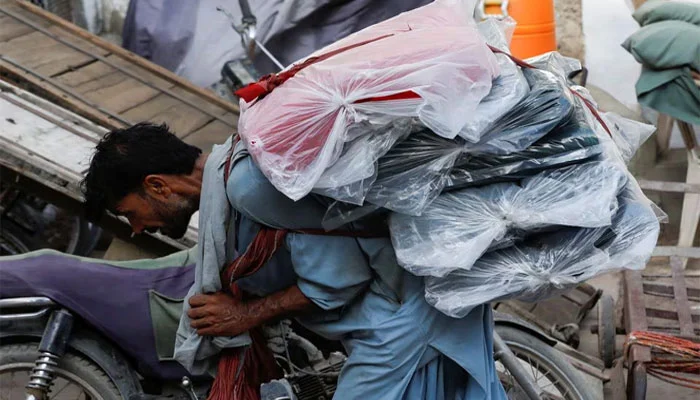ISLAMABAD: The Pakistan Bureau of Statistics (PBS) reports that in January 2024, inflation in Pakistan decreased for the first time in three months, to 28.34% year over year.
According to The News, inflation decreased from 29.66% to 1.32% in the preceding month. Nonetheless, when compared to the prior month, it represented a 1.8% rise.
Inflation in Pakistan is still in the double digits despite this increase, however it is still less than the 38% peak that was noted in May 2023. October 2023 saw a consumer price index (CPI) of 26.9%, while November 2023 saw it at 29.2%.
Even though the country has been getting assistance from the International Monetary Fund (IMF) since mid-2023, it still faces economic difficulties because of things like an intensified energy crisis,
increased taxes and a declining value of the rupee all exacerbate inflationary pressures.
In an effort to control inflation, the State Bank of Pakistan decided on January 29, 2023, to maintain the benchmark policy rate at a record-high 22% for a fifth consecutive year.
Independent economists, on the other hand, are skeptical, claiming that the policy rate might not be sufficient to combat the cost-push aspect of inflation as it exists today. They contend that the rate’s continued highness may hinder economic expansion because this method is usually used to combat demand-pull inflation, which is not the situation that exists here.
Rural inflation was 25.7%, while urban inflation was 30.2%. Inflation in the prior month was 27.9% in rural areas and 30.9% in urban areas. According to data from the agency, average inflation for the first seven months of the fiscal year (2023–2024) was 28.73%, compared to 25.4% for the same time in the previous fiscal year.
The central bank revised its previous estimate of inflation for the June-ending fiscal year. The previously stated range of 20 to 22% has been amended to 23 to 25%. This modification highlights the nation’s continued economic worries and difficulties.
According to a recent presentation from the Monetary Policy Committee (MPC),
“The MPC expects average inflation to trend down noticeably in FY25 and fall in the range of 23-25% in FY24.”
Similarly, core inflation, which does not include the price of food and energy, decreased to 17.8% in January 2024 from 18.2% in December 2023. The core inflation rate for January is at an 11-month low, which may lead the central bank to reevaluate lowering the policy rate.
The most recent CPI bulletin showed that price growth in a number of industries have slowed down. In particular, food prices increased by 25% in January 2024 as opposed to 27.5% in December 2023, while lodging and dining establishments saw a lesser increase—28.3% as opposed to 30.7%.
Compared to the previous 31.3% increase, transport expenses increased at a more modest rate of 26.2%. Comparably, the leisure and cultural sectors experienced a decline in the rate of price growth, with data indicating 32.6% compared to the prior 38.5%. Additionally, the acceleration of health-related expenses was lessened, with a current rate of 21.5% as opposed to the previous 23%.
In contrast, the housing and utilities sector saw a rise in prices during the reviewed month, with an increase of 38.7% as opposed to the prior growth of 37.7% in December. When comparing January 2024 to the same month the previous year, core inflation—a crucial component in determining policy rates—was recorded at 17.80%, the lowest level since February 2023. The historical mean between 2024 and 2010.







